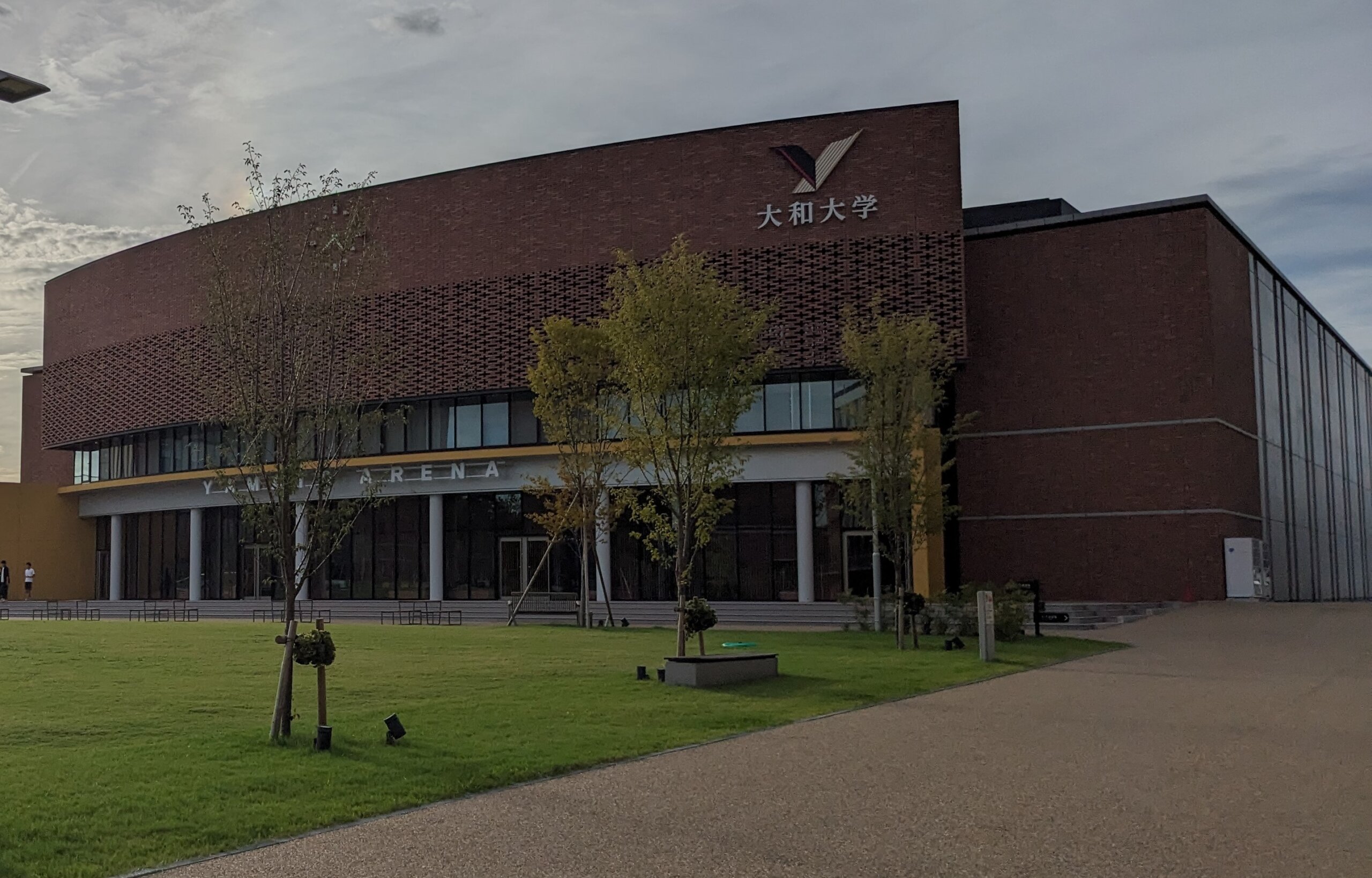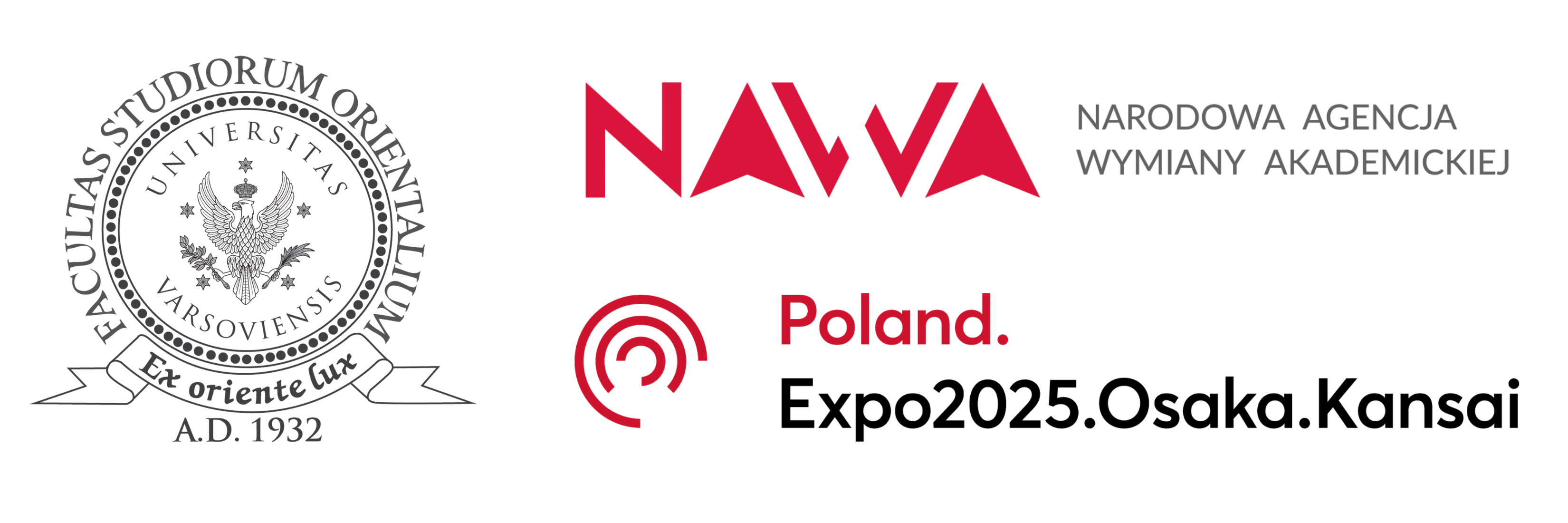9/07/2025 Students Symposium @Yamato Daigaku

Category: Students symposium and workshops
Building Safer Future. Agenda for Action
安全な未来を築く ~行動計画~
日ポ学生会議
Venue: Yamato University (Osaka), E402
Date: 9th July 2025, 15.00-18.00
Co-organizers: Yamato University, University of Warsaw
Cooperation: Daito Bunka University, Meijo University, Chukyo University, Kyoto University
Language: Japanese
Registration:
特別講演
Special Lectures
15.00 Prof. AMANO Kensaku 天野健作教授 (Faculty of Sociology YU)
身近にある未来革命 ~学生が仕掛けるサステナブルの挑戦~
[A revolution in the future: Students launch a sustainable challenge]
15.20 Asst. Prof. Anna BATORCZAK, PhD (University Centre for Research on Environmental Studies and Sustainable Development UW)
Students’ participation in the sustainability principles implementation at the university:
desired competences in education for sustainable development.
[大学において持続可能性を実現する際の学生参加ー持続可能性のための望ましい能力を養う]
日ポ学生会議
Japanese-Polish Student Symposium
Session I. 里づくりの概念、技術革新と社会の進化 [Concept of Satozukuri, Technological Innovations and Social Changes]
モデレータ:Prof. TACHIBANA Akira 立花晃教授(YU)
15.40 Zuzanna FIDZIŃSKA (UW/Ochanomizu University), 日本から学ぶ:地域活性化に向けた地方自治体の持続可能な取り組み [Learning from Japan: Sustainable actions by local governments for regional revitalization]
概要:発表では、日本の地方自治体と地域コミュニティが、人口減少、経済衰退、環境劣化といった地域課題に対処するために実施している持続可能な取り組みについて考察します。特に、住民主体の地方再生を目指す「里づくり」の概念に焦点を当て、自己統治、自然資源の持続的利用、伝統的な暮らしの再評価といった基本原則が、地域の長期的な活力にどのように貢献しているかを明らかにします。益田市、上勝町、里山地域の事例を通じて、里づくりの具体的な実践を紹介し、ポーランドを含む他国における農村地域の再生にも応用可能であることを考察します。
Abstract: This presentation examines how local governments and communities in Japan implement sustainability strategies to combat pressing regional challenges such as depopulation, economic decline, and environmental degradation. Focusing on the concept of satozukuri – a rural, community-driven approach to revitalization – it highlights how principles such as self-governance, sustainable resource use, and the preservation of traditional lifestyles contribute to long-term resilience. Through case studies from Masuda, Kamikatsu, and satoyama areas, the presentation illustrates practical applications of satozukuri and considers its potential relevance for rural revitalization efforts in other countries, including Poland.
15.55 Gabriel POPŁAWSKI (UW/EXPO), 日本とヨーロッパのスマートシティ [Smart cities in Japan and Europe]
概要:1990年代初頭に登場したスマートシティということは、現代技術に基づく地域開発の機会として世界中に広まった。比較的な若い概念ではあるが、世界各地でこの概念へのアプローチやその実施に違いが見られる。中央政府がスマートシティプロジェクトの主体であることが多い日本は、現在この分野のパイオニアであり、ポーランドを含むヨーロッパの都市にとってインスピレーションとなり得る.
Abstract: Emerging in the early 1990s, the idea of smart cities has spread around the world as an opportunity for regional development based on advanced technologies. Although it is a relatively young concept, there are noticeable differences in the approach and implementation in different parts of the globe. Japan, where the central authorities are often the main initiators of the smart city projects, is currently a pioneer in this field and can be treated as an inspiration for European cities including Poland.
16.10 YAMASHITA Yuki 山下侑起 (DBU), 利益と代償:情報とテクノロジーが人間に与えている利益と負担 [Benefit we take and price we pay: What do information and new technology bring to us?]
概要:Society 5.0の概念を説明し、日本における従来型社会とAIを中心として社会問題を解決するサイバー社会との共存の可能性、経済成長と人間中心の両立の可能性について考えながら、環境と労働の二側面から、情報とテクノロジーが人間に与えるメリットとデメリットを考える。
Abstract: The presentation is to discuss the concept of Society 5.0 and elaborate on the possibility of society in which economic development and the resolution of social issues are compatible with each other through a highly integrated system of cyberspace and physical space. In so doing it will examine the benefit we take from the new society and the price we must pay in terms of ecological issues and work environment.
討論者: Asst. Prof. KODAMA Eri 児玉恵理准教授 (YU), SUGIYAMA Akira 杉山央 (大東文化大学)
16.30-16.35 休憩(来場者入れ替え)
Session II. 人権 [Human Rights]
モデレータ:FUKUSHIMA Yuto 福島雄斗 (MU)
16.35 Maria ŻELAZOWSKA (UW/Rikkyo University) and SUGIURA Tamaki 杉浦珠樹 (MU), ヘイトスピーチの規制と表現の自由:ポーランドと日本の比較の視点から [Hate speech regulation and freedom of expression: from the perspective of Poland and Japan]
概要:近年、宗教・民族・国籍・人種・ジェンダー、その他のアイデンティティ要素をもとに、軽蔑的もしくは差別的な言動によって攻撃する、ヘイトスピーチが問題となっている。一方で、ポーランドも日本も表現の自由を憲法上の権利として保障している。本報告は、法学の視点からヘイトスピーチの規制と表現の自由というジレンマについて、両国の現状を比較しながら考察する.
Abstract: In recent years, hate speech, which includes derogatory or discriminatory words and actions directed at people on the basis of their religion, ethnicity, nationality, race, gender, or other identity factors, has become a serious problem. However, in both Poland and Japan, freedom of expression is guaranteed as a constitutional right. This presentation examines the dilemma between regulating hate speech and freedom of expression from a legal perspective and compares the current situation in the two countries.
討論者:Prof. TAKEDA Tomoki 武田知己教授 (DBU), Asst. Prof. Karolina WOJCIECHOWSKA (UW)
Session III. 21世紀の安全保障 [Security for the 21st Century]
モデレーター:IWAOKA Rimon 岩岡里門 (DBU)
17.05 NOGUCHI Kosei 野口航成 (DBU), IT社会におけるサイバー危機管理:~個人、国家、それぞれの「繋がる責任」を考える
[Cyber crisis management in the ICT society: Exploring distributed responsibilities in interconnected society and rethinking the roles of individuals and the state]概要:ICT社会が出現し、サイバー空間における危機管理とはどのようなものになっているのか。市民と国家が自ら積極的にこの社会につながる責任があるという視点から、日本はどのようにそれに取り組んでいるのかを考える。
Abstract: This presentation considers the new type of crisis management with the coming of information society and enlarged cyberspace and how Japan is coping or not coping with the changes in terms of “responsibility to interconnect”, rethinking the responsibilities of both the individuals and the government.
17.20 HASUMI Koshiro 蓮見皇志郎 (DBU), 日本の安全保障環境の変容と兵器技術 :ドローンを用いた大国との戦争 [Changing security environment and weapons technology in Japan and Poland: How can we resist great powers using new technology like drones? ]
概要:東アジアで軍事的に台頭する中国は、軍民融合技術を手掛けている。台湾有事の可能性も否定されていない。これらの事実に示される日本の置かれた安全保障の変容は、2022年のロシアによるウクライナ侵略によって、更に切迫感を増している。ウクライナ戦争はアジアと無縁でないのは、ウクライナ戦争で安価な中国製ドローンなどの新技術が利用されていることからも明らかである。しかし、日本や台湾は質量ともに中国に対する遅れが目立つ。本報告では、日本やポーランドはドローンに代表される新技術を利用することで大国に対してどのような大綱が可能であるかを考える。
Abstract: This presentation examines the changing security context in which Japan and Poland find themselves in the face of the rise of great powers such as China and Russia and the possibility of Taiwan contingency or Ukraine war. The two different theatres are not very far as they may seem: inexpensive Chines drones are frequently used in the Ukrainian soil. Japan and Poland are behind China in the field of drone technology. The author will show how new technologies such as drones are being diverted to the military use in China and the possibility of Japanese-Polish cooperation in this field.
討論者:Prof. SADŌ Akihiro佐道明広教授 (ChKU), Asst. Prof. Katarzyna STARECKA (UW), FUKUSHIMA Iori福島伊織 (DBU)
Session IV: 文化を伝える・共有する [Sharing Cultures]
モデレータ:NOMURA Keita 野村啓太 (DBU)
17.35 Chihiro Takeda 武田知大 (KU)
日本文化を伝える日本人〜京都学派を中心に [Japanese culture and philosophy: the Kyoto School]
概要:京都学派とは、西田幾多郎とその弟子を中心とした哲学者集団である。20世紀初頭、彼らは独自の問題意識で、自身の思想や哲学を展開した。京都学派の思想を紹介し、日本の哲学と日本文化についてSDGsに関連付けて考察する。
Abstract: The Kyoto School (Kyoto Gakuha) refers to a group of philosophers centered around Kitarō Nishida and his disciples. In the first half of the 20th century, they developed unique philosophical perspectives grounded in their unique concerns and the intellectual context of modern Japan. This presentation introduces the thought of the Kyoto School and explores how Japanese philosophy and culture can be considered in relation to the Sustainable Development Goals (SDGs).
17.50 Dorota PIWKO (UW/Himeji Jogakuin), Gabriela LANGA (UW/Tohoku University)
AIによる異文化的誤解の可視化:ポーランド人と日本人学習者の誤用とAIフィードバックのコーパス分析 [Mapping intercultural misunderstandings in AI: A corpus-based study of Polish–Japanese learner errors and AI feedback]
概要:ChatGPTやDeepLなどの現代的AI言語モデルによる、日本語を学習するポーランド人学習者とポーランド語を学習する日本人学習者の言語的・語用論的誤りへの対応能力を検証する。敬語使用の不適切さ、直接・間接性のズレ、文化的に不調和なレジスターの選択といった異文化的誤解に注目する。AIによるフィードバックと専門家による注釈を比較分析し、異文化的配慮を要する言語教育へのAIの応用可能性を評価する。ポーランドと日本における言語教育と交流の文脈において、人工知能の教育的活用に関する知見を提供する。
Abstract: This presentations examines the ability of contemporary AI language models – such as ChatGPT and DeepL – to recognize and respond to linguistic and pragmatic errors produced by Polish learners of Japanese and Japanese learners of Polish. Focuses on intercultural miscommunication arising from inappropriate politeness strategies, mismatched levels of directness, and culturally incongruent register choices. Through comparative analysis of AI-generated feedback and expert human annotations, evaluates the potential of AI to contribute to interculturally competent language instruction. Offers insight into the integration of artificial intelligence in language education within the context of Polish–Japanese communication and exchange.
討論者:Urszula MACH-BRYSON (UW)
18.00 Closing Remarks & Agenda for Action
Prof. NISHIDA Shusaku 西田宗作教授 (Dean of the Faculty of Sociology, YU)
Prof. TAKEDA Tomoki (DBU), Prof. SADŌ Akihiro (ChKU), Assoc. Prof. YAJIMA Akira (MU), Asst. Prof. Katarzyna STARECKA (UW)
This project has been supported by the Polish National Agency for Academic Exchange (NAWA) under the DIRECT TO EXPO 2025 programme – the International Academic Event at World Expo 2025 in Osaka, Kansai (BPI/OSA/2024/1/00020/DEC/01).
